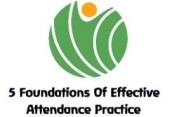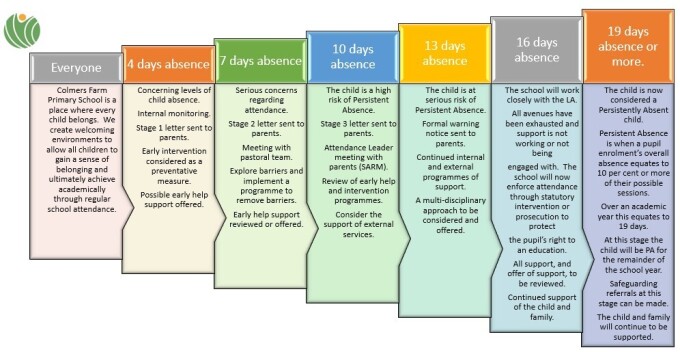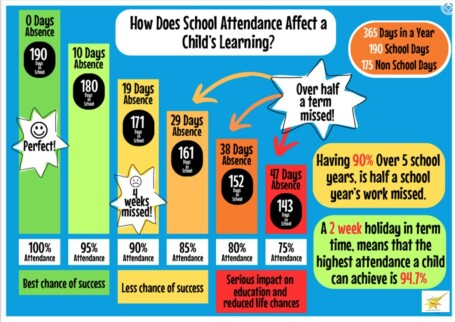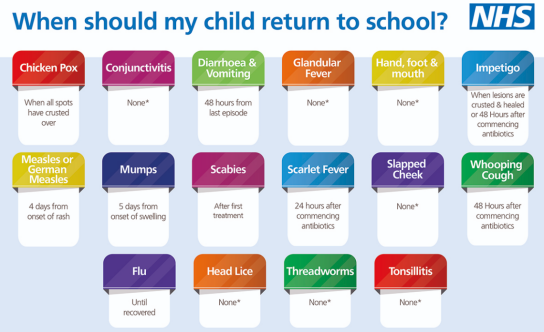Attendance
Colmers Farm Primary School's approach to supporting and improving school attendance
Going to school regularly is important for your child’s future. Parents are responsible for making sure their children receive full-time education. Talking to your child and their teachers could help solve any problems if your child does not want to go to school.

Colmers Farm Primary School adopts the 5 Foundations of Effective Attendance Practice framework, which is modelled on the work of Professor Katherine Weare. The framework allows schools to prioritise a whole school approach to supporting and improving attendance and is completely aligned to Colmers Farm Primary School’s values and ethos.
At our school we create a welcoming environment to allow all children to gain a sense of belonging and ultimately achieve academically through regular school attendance. Our emphasis is on developing a school culture and climate which builds relationships and a sense of belonging to ensure all children can attend our school and thrive.
When a child is absent from school they miss valuable learning opportunities, which will have a knock-on effect on their education as a whole. Children who miss time off school do not achieve as well as their peers. Not only do they miss the lessons, they also miss out on social aspects of school life, including making and maintaining friendships. This can then impact negatively on their emotional wellbeing and mental health.
The approach ensures we prioritise building trusting relationships with children/parents prior to any escalation. Our school policy is translated into practise through the processes and systems we follow and the escalated approach supports children and families at each stage.

Children who miss school will become part of the 'FAST-track to Attendance' programme which is co-ordinated by Birmingham Education Legal Intervention Team. (Click here for more information about this). This procedure, which aims to ensure children are in school, can lead to court proceedings for parents/carers.
Punctuality is also very important. Children start learning promptly in the morning and children who are late will lose out on their learning. The school will contact parents of children who are persistently late.
Regular school attendance
At Colmers Farm Primary School, attendance is extremely important. Your child is our top priority and if they are to achieve their full potential, they must be in school to learn. Good attendance shows secondary schools and/or future potential employers that your child is reliable and is an important life skill.
Colmers Farm Primary School records details of all children’s attendance and absence from school. We do so at the beginning of morning and afternoon sessions. If your child is absent, you must inform our school immediately. Failure to do this may result in a home visit.
Our school will record the absence and the Local Authority will receive this information for each child. The Department of Education also receives daily attendance data for the school.

Your responsibilities as a parent
By law, all children of compulsory school age must receive a suitable full-time education. For most parents / carers, this means registering their child at a school. Although some parents choose to make other arrangements to provide a suitable, full-time education.
Once your child is registered at a school, it is the parents’ / carers’ legal responsibility to ensure they attend on a regular basis. If your child does not attend school on a regular basis, you could be subject to a fine or be prosecuted in court.
Please click the booklet below to find out more about your responsibilities as a parent.
How to prevent your child from missing school
You can help prevent your child missing school by:
- making sure they understand the importance of good attendance and punctuality;
- taking an interest in their education, asking about schoolwork and encouraging them to get involved in school activities;
- discussing any problems they may have at school and letting their teacher know about any concerns;
- not letting children take time off school for minor ailments, particularly those which would not prevent you from going to work;
- arranging appointments and outings after school hours, at weekends or during school holidays;
- booking family holidays for the school holidays.
Common Conditions
If your child is ill, it’s likely to be due to one of a few minor health conditions. Whether you send your child to school will depend on how severe you think the illness is. Use this guidance to help you make that judgement.
Remember: if you’re concerned about your child’s health, consult a health professional.
- Cough and cold. A child with a minor cough or cold may attend school. If the cold is accompanied by a raised temperature, shivers or drowsiness, the child should stay off school, visit the GP and return to school 24 hours after they start to feel better. If your child has a more severe and long-lasting cough, consult your GP.
- Raised temperature. If your child has a raised temperature, they shouldn’t attend school. They can return 24 hours after they start to feel better.
- Rash. Skin rashes can be the first sign of many infectious illnesses, such as chickenpox and measles. Children with these conditions shouldn’t attend school. If your child has a rash, check with your GP or practice nurse before sending them to school.
- Headache. A child with a minor headache doesn’t usually need to be kept off school. If the headache is more severe or is accompanied by other symptoms, such as raised temperature or drowsiness, then keep the child off school and consult your GP.
- Vomiting and diarrhoea. Children with diarrhoea and/or vomiting should definitely be kept off school until at least 24 hours after their symptoms have gone. Most cases of diarrhoea and vomiting in children get better without treatment, but if symptoms persist, consult your GP.
- Sore throat. A sore throat alone doesn’t have to keep a child from school. But if it’s accompanied by a raised temperature, your child should stay at home.
- Chickenpox. If your child has chickenpox, keep them off school until all their spots have crusted over.
For more information, click on the following link. Is my child too ill for school? - NHS (www.nhs.uk)

Celebrating Attendance
Individual Awards
-
Bronze, silver and gold badges:
Every child with an attendance and punctuality of 97% or above for a whole term will earn a badge. The first term they achieve this they will earn a bronze badge, the second term will be a silver badge and if they have an attendance of 97% or above for all 3 terms they will achieve the gold badge. This means that children have 3 opportunities to achieve badges and 1 period of absence does not prevent children earning their badges throughout the rest of the school year.

Class Awards
-
EYFS & KS1:
The class with the highest attendance will be awarded a certificate and asked to look after the Colmers’ Cat for the week. Certificates will be displayed outside the classroom.
-
KS2:
The class with the highest attendance will be awarded a certificate and asked to look after the Colmers’ Camel for the week in. Certificates will be displayed outside the classroom.

Attendance Letters
Please find below important letters regarding attendance:


